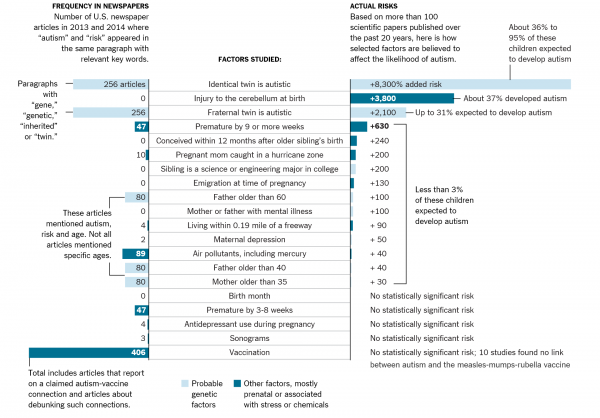You may recall Sam Wang, the Princeton neuroscientist whose statistical analyses I referred to frequently during the 2012 election. He now has an article in the New York Times where he analyzes the actual risks for causing autism versus the frequency of news coverage. As he says, “by far the largest risk is genetic. In comparison, the measured impact of environmental risks ranges from nonexistent to small, unless you work directly with chemicals in a factory.”
The results are strikingly presented in this graph and shows how the fear of vaccines causing it tends to dominate the coverage even though there is no statistically significant case to be made for it.
The vaccine fear-mongering of a few continues to cause trouble, with new reports of mumps outbreaks in Ohio and elsewhere.


When it comes to this anti-vax issue I think Penn &Teller put it best with this classic graphic demonstration here :
https://www.youtube.com/watch?v=RfdZTZQvuCo
WARNING Swearing, possibly Not Safe For Work. (But never mind that -- it’s spot on.)
Or maybe this musical clip puts it best :
https://www.youtube.com/watch?v=u1xw0Ob5bqs
instead.
(No swearing or other warnings needed here.)
And one more link if I may :
http://danamccaffery.com/
Because this is the reason vaccinations must happen.
Hi Mano--
That image is really hard to see, so I made a higher-resolution version that’s much clearer: http://i.imgur.com/qpvGBI9.png.
Yep. There is a fundamental flaw in journalism that for some stupid reason is actually touted as a worthwhile feature. It’s the old saw, “Dog bites man is not news, man bites dog is news”. But point in fact, if something is common, THAT is something that I need to know about, NOT the weird, rare, incidents.
@Marshall,
Thanks!
I think this is an extremely important and informative website about autism: http://www.howdovaccinescauseautism.com/
Sadly, I think the only thing that will convince some people to vaccinate will be dead children or kids in iron lungs and leg braces when polio inevitably returns to the United States.
Most antivaxxers that I know do not think that vaccines cause autism. They are more concerned about vaccine reactions that are more severe than the fever that most kids get (such as seizures, allergic reactions, etc). They will argue that the rate of reaction is low but the reactions can be severe and life altering and they don’t want to take the risk. They will also argue that the risk of anything really bad happening when you get the actual disease is also low -- while some children die from pertussis, most get over it just fine. And they argue that they don’t trust Big Pharma in collusion with the government (in the form of the CDC) -- they (rightly) feel that pharmaceutical companies are out to make a buck and (rightly or wrongly) that’s why so many vaccines, even things that are not life threatening like chickenpox, are on the required vaccine schedule. Many of these parents do vaccinate their children selectively and/or on a delayed schedule.
If we want to convince these parents to vaccinate their kids, we need to stop talking about autism. Most of the antivax parents I know are not talking about autism at all.
http://www.thehealthyhomeeconomist.com/six-reasons-to-say-no-to-vaccination/
This is an example of what people who are against vaccination write / say. The only people talking about autism are the pro-vaccine crowd.
I agree with songbird that for the most part the autism link is dead. Anti-vaxxers know they won’t be taken seriously if they bring it up. Instead their arguments now involve misunderstanding toxicity, immunology and risk.
For example, I had someone demand that vaccines be demonstrated to be 100% safe and toxin free before she would take them or give them to her children. Never mind that she didn’t apply that standard to any other aspect of her life. She was happy to get on her bike every day with no guarantee that she would get home safely. No amount of evidence of the safety and efficacy of vaccines would have convinced her.
We haven’t seen these diseases in the wild for so long that we’ve forgotten that these diseases can kill or leave children permanently disabled or infirm. Even something as “mild” as chicken pox can be fatal. I worry that thinkfree83 is right.
Here’s a way to freak that woman out: tell her that her table salt probably contains cyanide. It’s used as an anti-caking agent and its name is disguised, such as “potassium salt of prussate”, but if it has a name similar to that, it is a cyanide compound that she is sprinkling on her French fries.
Totally harmless, of course.